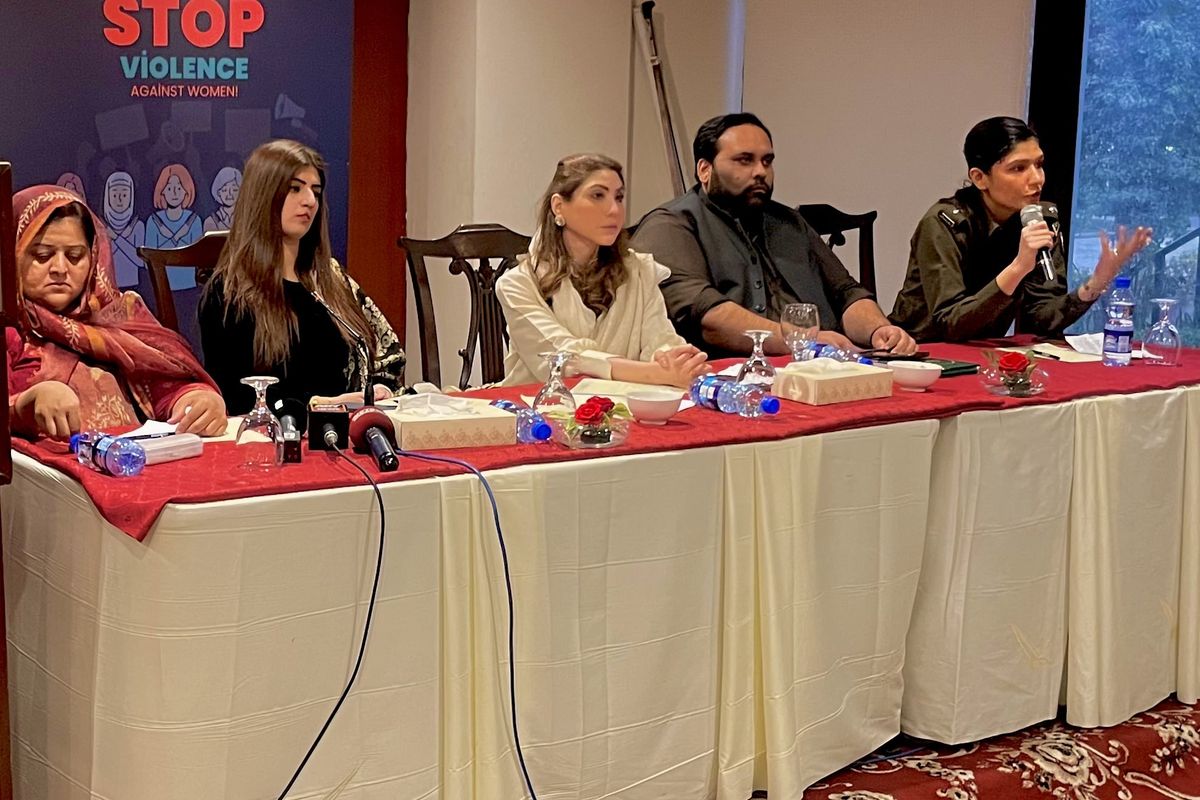"Over 20 girls raped daily in Punjab": Experts in Pakistan call for urgent action on gender-based violence
U.S. consul general in Lahore announces establishment of anti-rape crisis center in provincial capital

Laiba Zainab
Correspondent
Laiba Zainab is an award-winning journalist with nearly a decade of experience in digital media. She has received the DW & CEJ-IBA Data Journalism Award and the top digital media prize at the National Media Fellowship. At NUKTA, she covers underreported stories on health, crime, and social justice.

Usama Manj
Producer, Correspondent
Usama Manj is an experienced multimedia journalist with over 8 years in the industry. He began his career at Express News before moving on to Indus News as news producer and then worked for Aik News as a sports producer and anchor.

Panel discussion titled 'Empowering Communities on Gender-Based Violence: Strategies and Solutions for Sustainable Change' held in Lahore on Dec. 06, 2024.
Nukta
More than 20 girls are raped every day in Pakistan's most populous province Punjab, according to Hina Pervaiz Butt, chairperson of the Punjab Women Protection Authority (PWPA).
The alarming statistic emerged during a panel discussion hosted by the Pakistan-U.S. Alumni Network (PUAN) in collaboration with the Punjab Social Welfare Department (PSWD) and PWPA on Friday, sparking urgent calls for action to combat gender-based violence (GBV) in Punjab.
The event, titled 'Empowering Communities on Gender-Based Violence: Strategies and Solutions for Sustainable Change', took place at a time when global and local attention is increasingly focused on the issue.
Kristin K. Hawkins, U.S. Consul General in Lahore, opened the discussion with a stark reminder: one in three women worldwide — approximately 736 million — experience physical or sexual violence in their lifetime.
“Gender-based violence is a pervasive issue that impacts every society, and addressing it requires global partnerships and community engagement,” Hawkins said. She also announced the establishment of an anti-rape crisis center in Lahore.
A broader look at the problem
The discussion provided a platform for both policymakers and practitioners to share insights into the challenges faced by survivors of GBV in Punjab. The province has long grappled with systemic issues that exacerbate violence against women, including patriarchal norms, lack of awareness, and limited access to justice.
Between 2017 and 2021, over 21,900 women were raped in Punjab, making it the region with the highest number of reported cases of sexual violence in Pakistan.
Gaps in support systems
The panel shed light on existing support mechanisms. Khawaja Muhammad Sikandar Zishan, Director General of the PSWD, discussed the role of district industrial homes, known as Sanatzar. These centers train and rehabilitate underprivileged women, but Zishan acknowledged significant gaps in their outcomes.
“Out of 34,000 women trained, only 3,000 became entrepreneurs or started earning,” he said. “There’s a clear need to address public mistrust in government programs and improve connectivity with civil society.”
The session also highlighted the plight of victims housed in Punjab’s Dar-ul-Amans — shelters for women facing violence. Despite being established in all eight divisional headquarters of Punjab, these shelters currently house only 479 women.
Financial independence as a key solution
Hawkins emphasized financial independence as a critical factor in breaking cycles of abuse. She highlighted the Academy for Women Entrepreneurs (AWE), a U.S. State Department initiative that has mentored over 330 Pakistani women since 2020.
“AWE equips women with the skills and knowledge to start and scale businesses, giving them a pathway to independence and empowerment,” Hawkins said.
Legal and cultural challenges
Assistant Superintendent of Police Shehrbano Naqvi underscored the challenges police face in dealing with cases of domestic violence and sexual abuse.
“Domestic violence often stems from property disputes, and women are often denied their rightful inheritance,” Naqvi said. She urged women to report abuse and property disputes, but acknowledged societal barriers.
“We’re working to change the narrative, but trust in law enforcement remains low,” she emphasized, adding, “No one is judging you at a police station.”
Naqvi also shared harrowing details of cases where women were coerced into degrading situations by their partners, pointing to the urgent need for cultural and legal reforms.
Media’s role and the digital gap
Dr. Ayesha Ashfaq, chairperson of the Department of Media and Development Communication at the University of Punjab, stressed the importance of media in raising awareness.
“Media plays a critical role in educating survivors about their rights and available resources,” she said.
While the panel fostered important dialogue, participants agreed that more needs to be done. They called for synergy among government departments to combat gender-based violence effectively, but many agreed that practical implementation of policies remains a challenge.
“Discussions are important, but action is critical,” said one attendee. “Until survivors feel safe walking into a police station or a women’s protection center, these conversations will remain theoretical.”
Another criticized the lack of digital media experts in the discussion, noting the increasing dominance of online platforms over traditional media in Pakistan.
As Punjab moves toward implementing new initiatives like the anti-rape crisis center, experts agree that a holistic approach is needed to address the structural and cultural barriers perpetuating GBV.










Comments
See what people are discussing